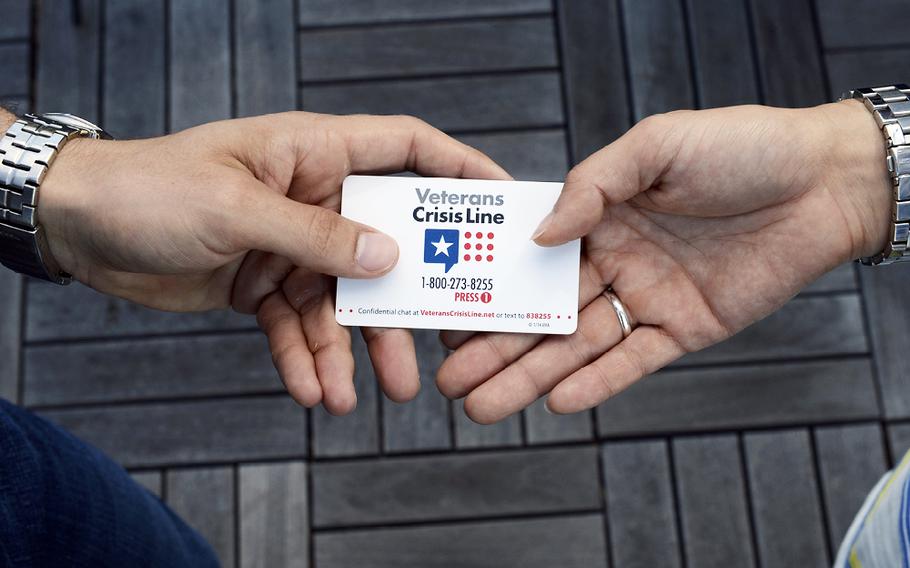
Veterans in crisis, or their families, are urged to contact the Department of Veterans Affairs Veterans Crisis Line. Dial 1-800-273-8255, and then press 1, or text the crisis line at 838255. An option to chat online is available at veteranscrisisline.net. (Department of Veterans Affairs)
Stars and Stripes is making stories on the coronavirus pandemic available free of charge. See other free reports here. Sign up for our daily coronavirus newsletter here. Please support our journalism with a subscription.
WASHINGTON — The coronavirus pandemic prompted an increase in calls to the national crisis hotline for veterans, but not enough to overwhelm call centers, an independent watchdog agency reported Wednesday.
Calls to the Veterans Crisis Line hit a high point in March as the coronavirus pandemic altered everyday life in the U.S. Despite the increase in calls and a shift to teleworking, responders met all their performance standards, including the answering of all calls within three rings, according to the Department of Veterans Affairs Office of Inspector General.
In a report issued Wednesday, the OIG described the hotline’s response to the pandemic as “remarkably successful.”
“The OIG was impressed with [Veterans Crisis Line] leaders’ and employees’ efforts to … ensure that the [hotline] met its mission to provide immediate access to crisis intervention services during the COVID-19 pandemic,” the watchdog office wrote.
The onset of the pandemic led many Americans to experience social isolation, fear, anxiety, unemployment and financial strain. Some mental health experts and veterans’ advocates worried about the effects among military members and veterans, who already experience disproportionate rates of suicide. They speculated that the Veterans Crisis Line could see a surge in call volume.
While the Veterans Crisis Line did see an uptick in March, the demand slowed to pre-pandemic levels by the end of May.
In March, when calls were at their highest, responders handled 56,386 calls, up about 11% from the previous month. The crisis line also handled 6,923 online chats, up about 11% from February, and 3,024 texts — an increase of about 7%.
The crisis line received 53,753 calls in May — down about 5% from March. Online chats decreased by about 3.5% and texts were down about 3% from March to May.
While the call volume was at its highest, the crisis line was shifting hundreds of workers to telework. The call centers — in New York, Georgia and Kansas — were deemed unsafe because staff worked close to each other in shared cubicles.
On March 21, the VA called for a rapid shift to telework. The department acquired 300 computers, 600 monitors and 300 iPhones for call center responders. By the end of April, 738 employees were working from home.
According to the OIG, the call centers continued to meet performance targets during the transition. Since responders started teleworking, morale has improved and calls are being answered more quickly than before the pandemic, the report says.
Before the pandemic hit, calls to the crisis line were typically answered within nine seconds. During the transition, that slowed to about 10 to 12 seconds. In May, once responders were working from home, calls were answered in about 8.5 seconds, the OIG reported.
Though the crisis line met performance standards, employees reported increased stress in their personal lives. Some were feeling overwhelmed. The VA provided emotional support services to responders at call centers, including relaxation areas and team support, which aren’t available while working from home. The loss of those resources has affected employee wellness, the OIG reported.
While the Veterans Crisis Line returned to pre-pandemic call levels by the end of May, it remains unclear exactly how the pandemic has affected veterans’ mental health.
Experts continue to speculate the ongoing pandemic is worsening mental health problems across the country. Earlier this month, Gen. James C. McConville, the Army’s chief of staff, said the pandemic was taking a toll on the mental health of soldiers and could be a factor in this year’s increase in suicides in the service.
The VA is encouraging veterans in crisis, or their families, to contact the Veterans Crisis Line. Dial 1-800-273-8255, and then press 1, or text the crisis line at 838255. An option to chat online is available at veteranscrisisline.net.
wentling.nikki@stripes.com Twitter: @nikkiwentling